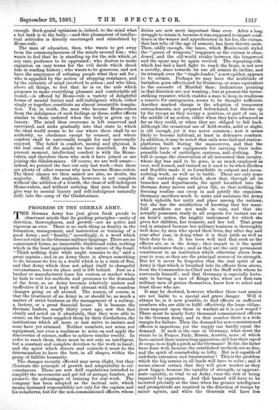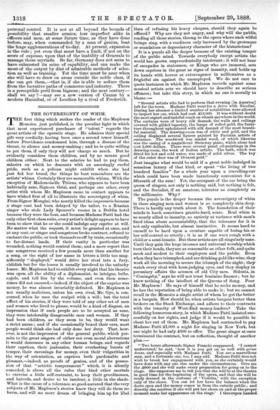PROGRESS IN THE GERMAN ARMY.
rE German Army has just given fresh proofs to observant minds that its guiding principles—unity of direction, thoroughness, and growth—are as active and vigorous as ever. There is no such thing as finality in the formation, management, and instruction or training of a good Army ; and " finality," accordingly, is a word which does not exist in the German military language. There are no consecrated forms, no immutable traditional rules, nothing which in the least approximates to the nature of the fossil. " Think nothing done while aught remains to do," said a great captain; and in an Army there is always something to do, because we live in a world which is in a state of flux, and that Army which does not adapt itself to changeful circumstance, loses its place and is left behind. Just as a banker or manufacturer loses his custom or market when he fails to suit his methods and processes to the demands of the hour, so an Army becomes relatively useless and ineffective if it is not kept well abreast with the ceaseless changes going on all around. The reason, of course, is that the treatment of an Army is. or should be, as much a matter of strict business as the management of a railway, a factory, or a great financial house. It is because the German leaders, nearly thirty years ago, saw this fact clearly and acted on it absolutely, that they were able to create, on the basis supplied them by their forefathers, the institutions which all more or less strive to imitate and none have yet attained. Neither numbers, nor arms, nor equipment, nor even a readiness to seize on and apply the discoveries of science, suffice to achieve similar results. In order to reach them, there must be not only an intelligent, but a constant and complete devotion to the work in hand; and the spirit which directs and controls it must be the determination to have the best, in all shapes, within the grasp of fallible humanity. The changes recently effected may seem slight. but they illustrate the principle of growth and adaptability to cir- cumstances. There are new drill regulations intended to simplify the movements and get rid of antique lumber, yet preserve the advantages of training for real work. The company has been adopted as the tactical unit, which means increased responsibility not only for the captain and his subalterns, but for the non-commissioned officers, whose duties are now more important than ever. After a long struggle to retain it, because it was supposed to impart confi- dence in the wearer and apprehension in his foe, the cuirass, that last relic of the age of armour, has been thrown aside. Then, oddly enough, the lance, which Montecuculi styled the " queen of weapons," reappears as the cuirass is aban- doned, and the old-world rivalry between the longsword and the spear may be again revived. The repeating-rifle, which has had a hard fight to reach the front, is not now a novelty, since towards its use all armies do incline, and its triumph over the " single-loader," a new epithet, appears to be certain. Perhaps we may have the multitude of battalion guns affectioned by Gustavus, or some equivalent to the amuntte of Marshal Saxe. Indications pointing in that direction are not wanting ; but at present the terror- striking repeater, which enables a man to keep in readiness a reserve for emergencies, seems to be thought sufficient. Another marked change is the adoption of temporary entrenchments, not prepared beforehand, but thrown up by the troops as they occupy a position, or part of one, in the middle of an action, either when they have advanced is far as they could, or when they are obliged to fall back. Although the occasional use of field-works, solid or slight, is old enough, yet it was never common ; now it seems likely to become habitual, at least in defensive combats. In addition, it may be noted that rails were laid and station- platforms built during the manoeuvres, and that the infantry have new equipments for carrying their indis- pensable loads of cartridges, canteens, and clothing. Nor will it escape the observation of all interested that cavalry, whose day was said to be gone, is as much employed as ever, well horsed, and trained as it used to be when Ziethen and Seydlitz made it so formidable in outpost and recon- noitring work, as well as in battle. These are only some of the outward signs which show that, through all its branches and departments, the spirit breathed into the German Army moves and gives life, so that nothing like freezing routine can creep in and petrify the organism. Germany sacrifices much to make and maintain the Army which upholds her unity and place among the nations; but she has the satisfaction of knowing that her mani- fold sacrifices are not made in vain, and that she actually possesses, ready in all respects for instant use at an hour's notice, the mighty instrument for which she gives her children, her treasure, and her toil. That great end is attained because her military business is thoroughly well done, by men who spend their lives, day after day and year after year, in doing what it is their pride as well as their duty to do. It has been well said that such as the officers are, so is the Army ; they impart to it the spirit which animates them ; and as they are the only permanent constituent in an institution which otherwise alters from year to year, so they are the principal source of its strength. But let it never be forgotten that the real spirit of an Army is that which is breathed into its officers from above, from the Commander-in-Chief and the Staff with whom he surrounds himself ; and that Germany is especially fortu- nate in having a race of Kings who, when not first-rate military men of genius themselves, know how to select and trust those who are.
It may be doubted, however, whether these vast armies are not liable to a special and grave danger. Will it always be, is it now possible, to find officers in sufficient numbers who are able to fulfil- effectively the large obliga- tions imposed upon them in warfare as it is now waged ?
There must be nearly forty thousand commissioned officers in the German Army, and in that number there is a wide margin for failure. Then the demand for non-commissioned officers is imperious, yet the supply can hardly equal the demand. If such is the case in Germany, what must the strain be in France, Italy, Russia, Austria, none of which have carried their instructing apparatus, still less their esprit de corps, to so high a pitch as the Germans? So far, the latter have done well, because the established methods are so fine, and the spirit of comradeship so lofty. But is it capable of indefinite extension and transmission ? This is the problem which the big armies in all lands will have to solve ; and it seems almost certain that they will grow weaker as they grow bigger, because the equality of strength, or approxi- mate equality, so vital to an Army, runs the risk of being impaired by expansion. And this hazard will have to be incurred precisely at the time when far greater intelligence and promptitude are required in the direction of troops by minor agents, and when the Generals will have less personal control. It is not at all beyond the bounds of possibility that smaller armies, less imperfect alike in officers and men, at some future time, as they* have done before, may, when commanded ,by a man of genius, beat the huge agglomerations of to-day. At present, expansion is the rule ; yet even that must have a limit, if not on the score of expense, upon that of the inability of Generals to manage these myriads. So far, Germany does not seem to have exhausted its mine of capability, and can make the most of the output by dint of admirable methods of selec- tion as well as training. Yet the time must be near when she will have to draw on areas outside the noble class, if she can get them,-'-that is, if she is able to seduce them from the lucrative paths of commerce and industry. There is a, perceptible peril from bigness ; and the next century— shall we say ?—may see a new version of Cannes by a modern Hannibal, or of Leuthen by a rival of Frederick.







































 Previous page
Previous page